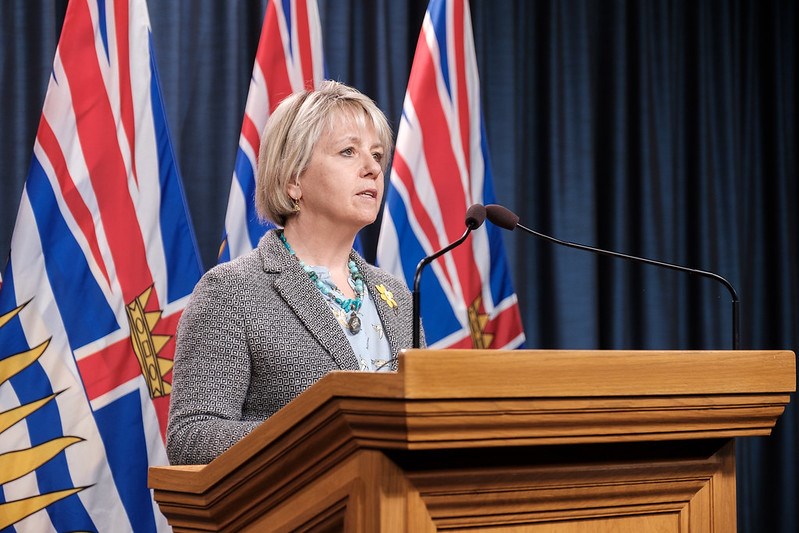B.C.'s rampant spread of the COVID-19 variant Omicron has led the province to a record 33,194 active infections.
Today's was the 16th consecutive data update with a higher number of active infections, and the eighth straight data update with a record number of active infections.
Consistently high new infections are driving these records, and while the 3,144 cases identified in the past 24 hours is not a record, it remains much higher than health officials would like.
Provincial health officer Bonnie Henry has for weeks told vaccinated people who have mild symptoms to isolate and not go to testing centres, so there is some doubt as to the accuracy of daily case counts. Henry today also downplayed the significance of the daily counts, as an indicator of the scope of the pandemic.
"We've been trying to move away from the daily case counts as an indicator of what's happening because they only reflect case rates and testing rates in different areas," she said. "The seven day rolling average gives us a better sense, because that takes into account daily variations that we see in different testing centres."
B.C.'s seven-day moving average for new infections was around 345 at the beginning of December. It has since spiked by nearly 10 times, to 3,335.
In an attempt to quell the surge in cases, Henry ordered all business in the province to have COVID-19 safety plans, although she acknowledged that "vast majority" of businesses have kept in place their COVID-19 safety plans since early in the pandemic, when she first required businesses to initiate those plans.
COVID-19 hospitalizations have been on the rise in each of the past seven data updates, and are now 349. Of those, 93 people are in intensive care units (ICUs.)
Health Minister Adrian Dix today gave an update on hospital occupancy. B.C.'s hospital system is divided into acute care, which is for most patients, and ICUs for more serious illnesses. Of B.C.'s 11,582 total acute-care beds, including ones added during the pandemic and needing extra resources, 9,371 are filled. That is up from 9,034 people in those beds three days ago. Of B.C.'s 728 total ICU beds, 477 are filled – 23 more than three days ago.
Dix said January is a month in which hospitals are normally more occupied. The current 80.9% occupancy rate for acute-care beds across B.C. is lower than the 103.5% occupancy rate seen in hospitals pre-pandemic. Dix's concern is that the wave of infections will trigger an eventual surge in hospitalizations.
B.C.'s practice for counting hospital patients with COVID-19 is largely those who entered the hospital because of COVID-19 and have not yet gone a sufficient time period – usually 10 days following the onset of symptoms – to be considered no longer infectious.
The nine COVID-19 deaths recorded in the past day is the highest number of deaths in a day since December 9, when there were also nine such deaths.
Of the 276,875 people in B.C. known to have contracted COVID-19 since the first case was detected in January 2020, 240,198 – 86.8% – are considered by the government to have recovered. In most cases, that recovery status is determined when patients go 10 days after first exhibiting symptoms. Many people deemed recovered, however, continue to suffer long-term health problems.
Vaccinations are seen as one pathway out of the pandemic, as unvaccinated people in B.C. continue to have more severe illnesses once infected, compared with vaccinated people.
Unvaccinated people, however, are contracting COVID-19 infections in a slightly less proportion than their population. Between December 30 and January 5, people not vaccinated accounted for 17.1% of new cases. At the time, 19.6% of B.C.'s population was not fully vaccinated. Unvaccinated people between December 23 and January 5 accounted for 39.3% of COVID-19 hospitalizations in the province.
There are 4,410,494 B.C. residents who have had at least one dose of vaccine, while 94% of those, or 4,142,030, are considered fully vaccinated with two doses.
Most new doses of vaccine are third doses. Another 3,843 British Columbians received first doses of vaccine in the past day, while 1,823 received second doses, and a record 45,167 received their third jab.
The B.C. government estimates that 88.5% of eligible British Columbians, older than five years, have had at least one vaccine shot, while 83.1% of that eligible population is fully vaccinated with two jabs.
The B.C. government last year estimated that the province's total population is 5,147,712. Hence, Glacier Media's calculation is that nearly 85.7% of B.C.'s total population has had at least one dose of vaccine, and nearly 80.5% of the province's total population has had two doses.
Older British Columbians have shown to be more vulnerable to serious infections, and deaths, so it is a worrying development that the number of health-care facilities, seniors' care homes and retirement communities are developing outbreaks.
B.C. has 38 active outbreaks at those facilities, including two new outbreaks in Surrey in the past day – at Surrey Memorial Hospital and the Peace Arch Hospital Foundation Lodge. •



